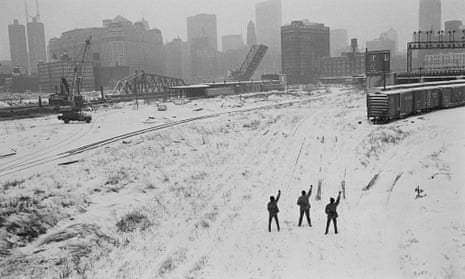I left Japan in August 1962 and arrived in New York just as the Cuban missile crisis was starting. I thought: “What? I came all this way to die in a nuclear attack?” But it was soon over. I moved to Chicago and couldn’t get a job, so I started my own catering business. Japanese food was not popular then and I knew enough to fool ignorant, naïve, rich people in Chicago. Then the Tribune did a story about me and somebody sent it to my mother. She called me and said: “Hiroji, stop doing this. We didn’t send you to America to be in the cooking business. I will not tolerate it.” Yes ma’am! I couldn’t say no to my mother so I focused on photography instead.
I had great curiosity and found myself welcomed by black people, white people, Indian people, whatever. They’d never seen Asian guys, so I had a big advantage and used it to get access to things. I just smiled and looked harmless. I could be like air. At the time, the Black Panthers were starting to get popular and I managed to get to know them. For some reason, these three leaders wanted to be photographed with a very big Picasso sculpture at Chicago City Hall. It’s not interesting, I said. Then it started snowing, so we went outside and I took this. I didn’t give them any instructions – they just went down there and saluted, never asking me anything about myself, or what I might be doing the picture for. They pretty much ignored me.
The designer of my new book is white English and he wanted this shot to be included. I’ve travelled 3 million miles and taken 4 million photos in the course of 55 years – and he was picking lots of black American pictures for the book. So I said: “Stuart, you are crazy. It’s out of proportion.” In a way, he’s scared – that’s why those pictures intrigue him. Me, I’m not afraid of them. But the English did nasty things. They made money by selling slaves. So maybe he’s intrigued out of a guilty conscience.
My childhood experiences during the second world war do affect what I photograph, though. Tokyo was bombed heavily and it scared me. When I was six, I saw fishermen killed by American aeroplanes before my eyes. So I refused to photograph war, conflict, or dead bodies. But somehow I ended up going out to Saigon during the Vietnam war, because so many other photographers were blacklisted by the South Vietnamese government.
I find America a very interesting place. It’s not quite a melting pot. American men – all of them want to be cowboys. It’s extremely religious, too. Mormons are strange people. And the agriculture is so huge. In North Dakota, they grow barley on a fantastic scale, and I wanted a photograph it from a small Cessna plane. A farmer had one and I asked him if I could hire it. Yes, yes, help yourself, he said. He thought I could fly it myself. This only happens in the US.
Hiroji Kubota Photographer is published by Aperture later this year.
CV
Born: Kanda, Tokyo, 1939.
Studied: Political science at Waseda University.
Influences: “André Kertész. He was my brother, my father, my grandfather, my mentor.”
Low point: “I could only take $500 out of Japan, so my first month in New York I ate only bananas. They were so expensive in Tokyo, but just five cents in New York.”
High point: “What a wonderful life. I’ve seen the world.”
Top tip: “One has to work like mad, and eat and sleep with nothing but photography. And have a basic knowledge of this impossibly complex planet we live on.”

Comments (…)
Sign in or create your Guardian account to join the discussion